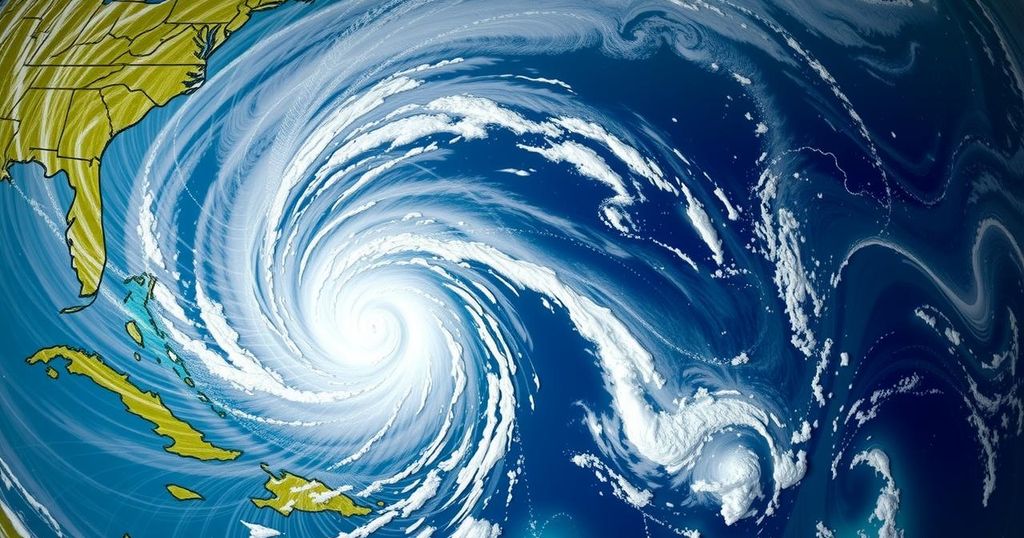Review of the 2024 Atlantic Hurricane Season: An Unprecedented Year of Extreme Weather

The 2024 Atlantic hurricane season documented 11 hurricanes, surpassing the average of seven, and caused extensive damage particularly on the Gulf Coast. Notable storms included Hurricane Beryl, which was the first recorded Category 4 hurricane in June, and Hurricane Helene, the deadliest storm since Katrina. Climatic shifts associated with ocean temperatures are believed to influence storm intensity and frequency.
The 2024 Atlantic hurricane season concluded on Saturday, exhibiting a significantly active cycle with 11 hurricanes, exceeding the historical average of seven. The disturbances wreaked havoc far beyond their landfall locations, particularly on the Gulf Coast of the United States. Meteorologists have described this season as extraordinarily busy, primarily due to elevated ocean temperatures. Among the eight hurricanes that impacted various regions, notably Grenada, Cuba, Jamaica, and the Dominican Republic, Hurricane Beryl distinguished itself by becoming the first recorded Category 4 hurricane to develop in June.
Beryl made landfall on the island of Carriacou, leading to considerable destruction in Jamaica and claiming two lives. The rare occurrence of such a powerful hurricane, following the precedent set by Hurricane Dean in 2007, was highlighted by Brian McNoldy, a researcher at the University of Miami. Additionally, Beryl intensified into the earliest recorded Category 5 hurricane in the Atlantic by July 1, a timeline inconsistent with typical hurricane trends, as major categories usually do not form before September 1.
During September, Hurricane Helene emerged as the deadliest storm to strike the U.S. mainland since Hurricane Katrina, resulting in over 200 fatalities. North Carolina sustained substantial damages estimated at $48.8 billion, with extensive destruction to residences, agricultural assets, and water systems. Adjacent states, including Florida, Georgia, South Carolina, Tennessee, and Virginia also experienced severe consequences from the storm. The rapid intensification of Hurricane Milton in October brought maximum wind speeds of 180 mph, qualifying it among the strongest hurricanes recorded in the Gulf of Mexico, second only to Hurricane Rita in 2005.
The rainfall from both Helene and Milton was historically significant, with some areas receiving triple their average rainfall during September and October, marking these months as the wettest on record for cities like Asheville, Tampa, and Orlando. In November, Hurricane Rafael, which reached winds of 120 mph, closely approached the strongest November hurricane record for the Gulf of Mexico, impacting Cuba during its recovery from Hurricane Oscar’s aftermath.
Profoundly influenced by unusually warm ocean waters, hurricanes have formed with greater intensity and frequency, challenging traditional expectations regarding their development patterns. As McNoldy articulates, “In other words, we never had a storm as strong as Beryl so early in the season anywhere in the Atlantic and we never had a storm as strong as Milton so late in the season in the Gulf of Mexico.” Furthermore, he notes, “I do not ever point to climate change as causing a specific weather event, but it certainly has its finger on the scale and makes these extreme storms more likely to occur.”
The Atlantic hurricane season is a recurring climatic event characterized by the development of tropical storms and hurricanes across the Atlantic Ocean. Occurring annually from June 1 to November 30, it has specific patterns regarding the formation of storms, influenced by a multitude of environmental factors, including ocean temperatures. The 2024 hurricane season has been notably active, prompting analysis of meteorological trends that correlate warm ocean temperatures with an increase in both the frequency and intensity of storms. This season’s events reflect a shift that could be attributed to ongoing climate change, prompting scrutiny from meteorological experts.
In summary, the 2024 Atlantic hurricane season has been marked by an unprecedented number of storms that have caused widespread devastation across multiple regions. The elevated ocean temperatures are contributing to a paradigm shift in hurricane behavior, resulting in a higher frequency and intensity of storms. Experts warn that these patterns may indicate a growing correlation with climate change, raising alarms about the future of hurricane preparedness and response efforts in vulnerable areas.
Original Source: nsjonline.com






